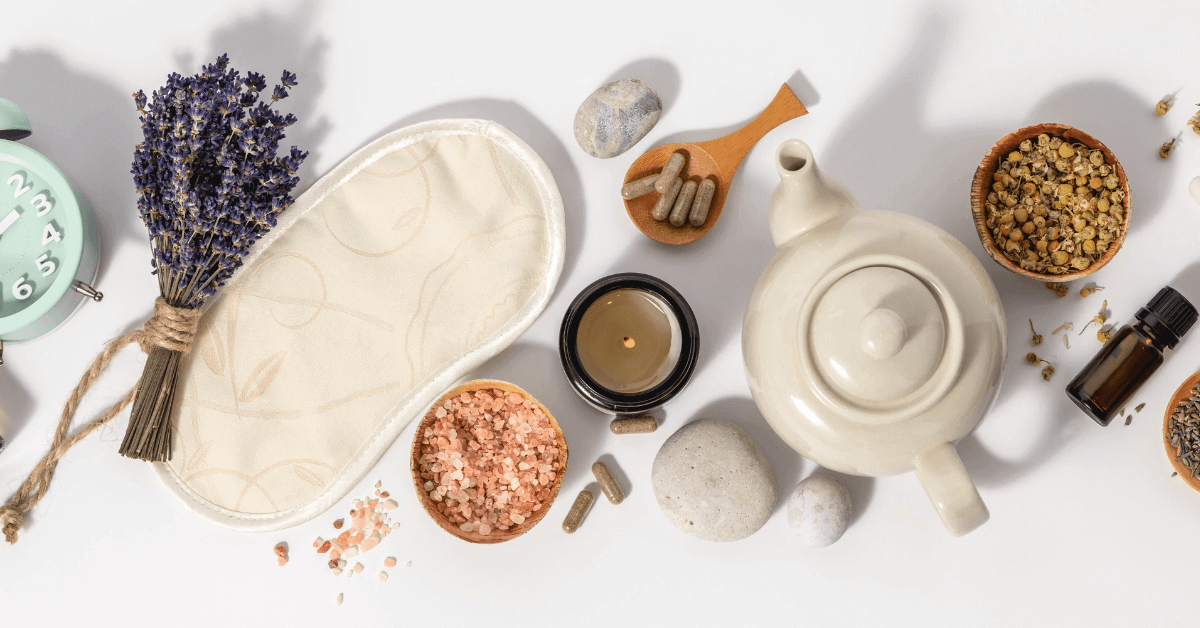Postpartum Insomnia: 5 Life-Changing Herbal Remedies
Insomnia After Childbirth
Why are you awake when everyone else is sleeping? It's frustrating to lay there with streaming thoughts when you reach the end of a long day as a mother. You can't shut your brain off!
Or, maybe you fall asleep, but wake up startled and cannot go back to sleep.
The worst part? When you don't sleep, you tend to reach for coffee and sugar to keep you going all day then the cycle begins again the next night.It's exhausting.I can relate. When my twins were born, I struggled with twenty-four long months of insomnia. I cracked.
In this post, I'll share the safe herbal remedies to get yourself back to sleep, even if you don't feel postpartum anymore.
But, wait! If these remedies don't work, there may be three additional reasons you have insomnia.
Postpartum insomnia causes
It could be a variety of reasons but here are the top three reasons why you can't sleep.
#1 Postpartum adrenal fatigue or exhaustion - a term created when our bodies are depleted and we struggle with sleep, exhaustion, and other strange symptoms with no real diagnosis. You can learn more about it here.
#2 You may have too much estrogen or you're unable to process the estrogen in your body. {more below}
#3 Or, you may have unresolved trauma, that you may or may not remember. Read that again 👈 I talk about my experience on my YouTube channel with my therapist. Watch it HERE.
The number one reason you have insomnia is probably from interrupted sleep from a newborn creating postpartum adrenal fatigue. But, don't rule out #3 - trauma.
If you've had unresolved trauma (even if you don't remember it), it's common for it to resurface during the postpartum time - creating anxiety and insomnia
So, ask yourself these questions?
Are you comfortable in your bedroom?
When you wake up, can you back to sleep? Jot down the circulating thoughts you're experiencing.
Have you had unresolved trauma in your bedroom in years past? Write it down.
Have you tried therapy?
Listen in on how EMDR therapy helped me after the death of my husband AND my unknown, unresolved trauma resurfaced: https://youtu.be/zs43rNgYzRY
Postpartum insomnia symptoms
Signs of postpartum insomnia include:
unable to go to sleep - your mind is racing
you fall asleep - but wake up moments after startled
maybe you fall asleep, but the baby wakes you you can't go back to sleep
or you wake up @ 5:00 am with your heart pounding out of your chest
------ Here are some of my favorite botanicals to help you get to sleep faster, along with the breastfeeding safety recommendations.
5 Postpartum insomnia natural remedies
#1 Passionflower or Passiflora incarnate
Passionflower is a nervine, sedative, and pain reliever. It helps with circular thinking; if you can't shut your mind off at night. You lay there thinking about everything you have to do. Some say it's like having a talk radio in their heads and you can't find the off switch. ²I use it for teeth grinding, wry neck, and when I'm very stressed.
Dosing: Tincture; 30 drops, 2-3x day. Tea; 1-2 tsp. of dried herb in 8 oz. water, steep 20-30 min. Drink up to 4oz., 4x a day.
Breastfeeding safety: It's considered L1/L2 safe while breastfeeding by the German Commission E. ³ The Botanical Safety Handbook suggests Passionflower is a Class 1; history of safe traditional use.
#2 Motherwort or Leonurus cardiaca
An amazing botanical for mothers of all ages for simple anxiety and heart palpitations, but not to be used during pregnancy. As its name suggests; cardiaca - it helps reduce heart palpitations and stress-induced high blood pressure. Motherwort can be a great ally for you if you don't have trouble falling asleep but routinely wake up at 2 or 3 am and can't get back to sleep. Mix it with passionflower for the best results. If you're yelling and screaming a lot or if you have any reproductive symptoms such as; menstrual pain, lack of bleeding, ovulatory pain, and menstrual headaches, this may be a good choice for you. Because motherwort is bitter, I prefer to take it in a tincture form.
Dosing: 30 drops of a tincture; 2-3x day.
Safety issues: avoid during pregnancy
Breastfeeding safety; Considered a L1/L2 safe while breastfeeding by the German Commission E monographs. The Botanical Safety handbook considers it a Class 2b not to be used during pregnancy.
#3 Ashwagandha or Withania somnifera
Native to the regions of India, Pakistan, Sri Lanka, and parts of Africa; Withania was traditionally used in Ayurvedic medicine and offered as a powder with milk, ghee, and honey to boost your energy and stamina.
It's a calming adaptogen, so you can take it during the day and at night. The Hindi name for this plant, ashwagandha, refers to its horse seat-like order and it's believed to give you the strength and stamina of a stallion.
It's safe while breastfeeding and is rich in iron, so traditionally women would take Ashwagandha to treat iron-deficient anemia as a powder in milk mixed with molasses.
In Ayurvedic medicine, ashwagandha is traditionally used to promote lactation. ⁴
Ashwagandha Benefits
anxiety
fatigue
cloudy thinking
stress-induced insomnia
nervous exhaustion
chronic fatigue
and more, which can be great for new moms!
Ashwagandha and thyroid
Ashwagandha enhances endocrine function, to re-regulate the thyroid, testes, and adrenal glands. Therefore, it is suggested to use when you have hypothyroidism, but caution when you have hyperthyroidism.
And..it may increase Ca absorption
Per Dr. Aviva Romm...
In animals, Ashwagandha has been shown to increase circulating T4 levels with no influence on T3.
Another study noted both hormones (T3 and T4) increase.
At least one human case study has noted a medically relevant case of hyperthyroidism after the usage of a supplement containing Ashwagandha. - This makes sense since it potentially increases T4 and possibly T3.
There may be a gender difference in regards to T3 where men can produce more in response to Ashwagandha than women.
Tincture Dosing: 30 drops; 2-3x day. You may also explore the powder or supplement form of this botanical as well. 3-6g of powder is suggested.
Breastfeeding: Considered an L1 safe while breastfeeding with the Commission E. monographs and Class 2b. by the Botanical Safety Handbook; not to be used during pregnancy
Precautions: Ashwagandha may modify glucose levels, suggesting diabetics should monitor their sugar levels when taking this botanical.
#4 Lavender or Lavendula angustifolia
The first time I tried lavender tea, I hated it. I actually threw it away. But, now I crave it in small amounts. It's the best remedy when you've had too much coffee! It is also known as a carminative for people with gas, nausea, and vomiting. This is the botanical I use often as an essential oil and take internally when I have insomnia; with a product called Lavela.
Dosing: Tincture 15-30 drops or 3-4ml; 2-3x day or in a blended tincture. You may notice you want less lavender than other blends as the taste is strong and may affect the taste of your breastmilk.
In tea, use a small amount of 1/2 tsp. in 8oz. of water, 1-3grams, or I prefer to use it in a blended tea
Breastfeeding: Considered an L1 by the German Commission E. monographs, it's safe while breastfeeding. Botanical Safety Handbook considers it a Safety Class A.
#5 Skullcap or Scutellaria lateriflora
Skullcap is great for you if you're stressed out! If you're nervous, or agitated, have muscle spasms, nervous tics, or tight painful muscles. Master herbalist, David Winston, suggests using Skullcap as a fresh tincture or freeze-dried product.
Dosing: 30 drops; 2-3x day. Freeze-dried capsules, 3x day
Breastfeeding: Considered an L1/L2 Safe botanical while breastfeeding, but classified on a B2; avoid during pregnancy.
How long can postpartum insomnia last?
It can last years. You want to take care of your insomnia now, so it doesn't affect your body or your relationships with your partner and family. Additionally, you may have too much estrogen, or you're unable to process the excess estrogen - therefore you may have signs of too little progesterone. Insomnia is one of those symptoms.
Signs of low progesterone²
anovulation
anxiety
constipation
cyclic breast pain
depression
endometriosis
fertility problems
insomnia
irregular menstrual cycle
irritability, anxiety
long menstrual cycles (>35 days)
low libido
miscarriage
short luteal phase
spotting between periods
water retention
What can you do about low progesterone?
make elimination a priority {i.e. no constipation}
Reduce endocrine disruptors in your home
Invest in plastic-free storage containers and remove foods from them right away
Try eating organic fruits and vegetables, especially from the dirty dozen
choose wild-caught fish
choose grass-fed meats
Consider non-toxic cleaning and beauty supplies
Make sleep a priority
incorporate 2tbs. of ground flaxseed in your diet
Consider adding Vitex Chaste berry to your diet
Strive for 8-9 vegetables and fruits a day to aid elimination
Conclusion
Your body can heal from insomnia when you make YOUR health a priority. I suggest trying one botanical at a time and then purchasing a blended formula for your greatest success.
Keep in mind, that you may need conventional medication for a short time to help you sleep now and help your body heal, while you continue to work on your overall health and wellness.
The postpartum time can be very stressful. You're doing a great job. Comment below and let me know if you've tried any of these remedies.
xo Tara
References:
¹ Romm, Dr. Aviva; Hormone Intelligence pg. 34
² Winston, David & Maimes, Steven (2007); Adaptogens Herbs for Strength, Stamina, and Stress Relief. Healing Arts Press.
³ Romm, Aviva, (2014): Botanical medicine for women's health. Churchill Livingston.
⁴ Upton, Roy; Bear, Soaring, Winton, David; Gagnon, Daniel; Romm, Aviva Jill; Low Dog, Tieraona; Hardy, Mary; Craker, Lyle. Botanical Safety Handbook, Second edition (2013).CRC Press.

